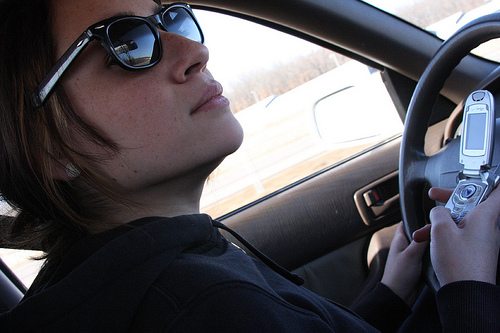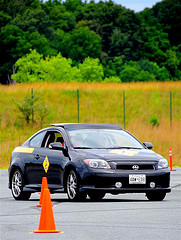When can I drive the family car?

In many states, you may obtain a learner′s permit before getting your license. It′s a violation if you drive without either a permit or license. States differ on the exact age requirements for permits and licenses.
If you′re a student and taking a driving course, you may apply for a student license and, once you′re fifteen or sixteen, apply for a driver′s license. Your mom or dad must sign the application with you, and they′re responsible for your driving. If you′re in foster care, you may ask your guardian or foster parent to sig, but they are not required to and may not be able to assume the additional responsibility.

Photo by Intothelens4149/Chuck
Under special circumstances, your state may issue a junior permit so you can drive at a younger age. This is possible in some rural areas where transportation to and from school is limited. There are also exceptions for driving farm equipment; some states don′t require you to be licensed. Check first before you operate any vehicle. When driving with a learner′s permit, you must be accompanied by a responsible licensed driver. Take a look at www.teendriving.aaa.com for state specific information about driving.
If you hit someone or damage someone′s property while driving, you and your parents are responsible for the hospital and repair bills. It′s illegal and extremely dangerous to drive under the influence of alcohol or drugs. You must be twenty-one to drink in the first place, so you′re committing two violations if you′re under twenty-one and drinking and driving. If you′ve been drinking or using drugs, make arrangements to ride with a sober designated driver.
Once you′re issued a driver′s license, you automatically agree to take a test given by a police officer if you′re suspected of drinking and driving. This blood-alcohol test measures the amount of alcohol in your body, and it may be used as evidence in court. If the amount is over the legal limit, you′re considered either under the influence of alcohol or intoxicated. You may be required to attend counseling or an alcohol education program.

Photo by Stuart Richards
Some states offer a Youthful Drunk Driver Visitation Program, in which you visit an alcohol recovery center or a hospital emergency room to witness persons injured in drunk-driving accidents, or the county morgue to view victims of drunk drivers. You may also be placed on probation or have your license suspended for a period of time.
It’s easy to be distracted when driving. The CD player, radio, cellphone and pedestrians are just a few of the things that take your eyes off the road. Texting while driving is a major distraction that’s slowly being outlawed around the country. Several cities and states have made it illegal to drive while texting [DWT] with fines running from $20 to over $400 for a first offense. Wait until you’ve parked before reading or sending a message.
On October 15, 2007 the U.S. Congress designated the third week of October as National Teen Driver Safety Week. The purpose is to emphasize parental monitoring of teen driving, continued consideration of graduated drivers-license laws, and education regarding distractions while driving, road rage and fatigue.
Did you know:
The minimum driving age in New Jersey is 17, while it’s 14 and 3 months in South Dakota. In Europe, Great Britain has the lowest at 17 while in the rest of the European Union you must be 18.


